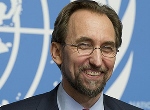United Nations: Human Rights Office ‘dramatically and chronically underfunded'
Published on Thu, 2017-02-16 20:00
The United Nations Human Rights Office has launched an appeal of nearly US$253 million in extra-budgetary funding for its work programme in 2017, with the UN High Commissioner for Human Rights lamenting that his Office is "dramatically and chronically underfunded". The UN Human Rights Office described this extra-budgetary funding as its most ambitious funding appeal yet, and that it would be in addition to the UN regular budget funding of US$107.56 million that is provided to the Office. The request for the extra-budgetary funding is for the programme of work of the Human Rights Office for 2017 which includes in-country assistance, support to UN independent human rights experts and the UN Human Rights Council, as well as a number of trust funds to support work on issues such as torture, contemporary forms of slavery and the rights of indigenous peoples. According to a UN news release, the Human Rights Office, through some 60 field presences and through partnerships with other international and local organisations worldwide, works to ensure that human rights principles have a real impact on the lives of people. In a foreword to the UN Human Rights Appeal 2017 report, launched on Wednesday, UN human rights chief Mr Zeid Ra'ad Al Hussein said: "Our world has entered a period of profound uncertainty." In numerous countries, he said, even the rules are under attack - xenophobia and calls for racial and religious discrimination have entered mainstream discourse and every day, seemingly, are more widespread and more deeply rooted. "A collective failure to prevent, minimize and resolve conflicts and proxy wars is feeding brutal extremist groups and creating wave upon wave of the most shocking human suffering, including forcing millions of people to flee their homes and everything they have ever known," he said. Zeid further said this "is cause for grave alarm - but not dejection. It is a cry not to despair but to action. And, it is evidence of the pressing need for broad based compassion, stability and inclusive development that human rights underpin." Investments in human rights today makes for prevention tomorrow - prevention of escalating violations and of the shattering impacts of conflict. "Human rights upheld returns stability to entire countries and regions by advancing justice for all," said Zeid. "Conversely, as we see now with utmost clarity in numerous countries, degradation of human rights undermines social justice; erodes political and economic stability; and eats away at every measure of human development. The outcome for people is calamitous." "Yet, together, we can stand in the way of this roll-back of human rights. The expertise developed by my Office through our presence in more than 60 countries and with our partners worldwide, does work," Zeid emphasised. "Our human rights advocacy helps persuade authorities, at every level, to better protect rights; and our technical assistance, from torture prevention to advancing women's equality, helps build local and enduring capacity so that these fundamental responsibilities can be fulfilled." "The need for this work is urgent and widespread," Zeid underlined. "With support, we can undertake strong preventive work, including for early warning and the prevention of hatred, xenophobia and violence. We can promote a broadening of inclusive democratic space; advance sound migration governance; and give strong support to the grounding of the 2030 Sustainable Development Agenda in human rights. But support is essential." "More than ever, we need strong partners to stand with us. My Office is dramatically and chronically under-funded. Our regular budget largely fails to fund the extensive field work that is essential to the fulfilment of our mandate." In the past year alone, Zeid noted, "12 countries have requested our support in vain - because no matter how great their need, we are simply unable to afford to provide the support they request." "The time to stand up for human rights is now," he stressed. According to the Human Rights Appeal 2017 report, in 2016, amongst others, some 96 country visits or missions were undertaken by the Special Procedures mandate holders (Special Rapporteurs and Independent Experts); 1,121 workshops were held for 40,000 people, at least 10,000 of whom were women; 605 trials were monitored and 3,241 monitoring missions were undertaken; 2,719 visits were made to places of detention; 47,000 victims of torture in 80 countries and 25,000 victims of slavery in 34 countries received rehabilitation support; and 250,000 publications and materials promoting human rights were distributed around the world. The report said that more than 59 per cent of the UN Human Rights Office's budget is funded through voluntary contributions. In 2016, the Office received US$129.5 million in extra-budgetary contributions, compared to US$125.8 million in 2015. While this was a welcome increase, the amount is still far from the US$217.3 For the last six years, the Office's extra-budgetary expenditure has exceeded annual income. This budget deficit has been absorbed by a surplus that was built up during the years in which the Office received more voluntary contributions than it spent. "While those reserves still allow for funding shortfalls to be covered in the 2016-2017 biennium, a situation in which income is not commensurate with spending is not sustainable in the long term," it said. Estimated expenditure for 2016 amounted to US$135 million, thus leaving the Office with an expected shortfall of US$5 million. Total extra-budgetary resources needed for 2017 amount to US$252.9 million. These are funds the Office would need in addition to its regular budget allocation of US$107.6 million if it is to respond to requests for assistance it has received for the year, said the report. By Kanaga Raja. Source: SUNS - South North Development Monitor, SUNS #8404 Friday 17 February 2017. Tags: |
SUSCRIBE TO OUR NEWSLETTER



